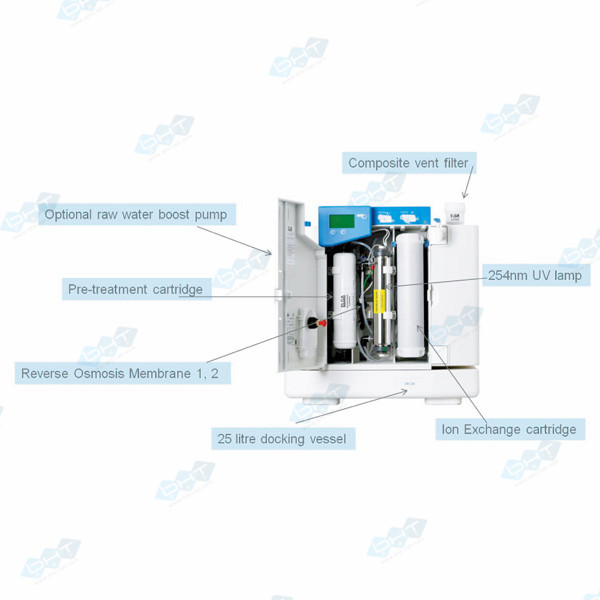1.Today, water environment is the most basic environment for most laboratories, occupying a very important position in experiment. Water quality often determines the authenticity and repeatability of the results of many experiments. Most experts in laboratories usually require that concentration of impurity elements and chemical compounds in pure water are in ppb level or even lower. In the laboratory scientific research field, the starting point of purification that people focus on is tap water. If there is distilled water, deionized water or reverse osmosis water in laboratory, people will then only focus on the process of super purification.
在当今的实验室中,水环境作为绝大多数实验室的基本环境,在实验中占的地位非常重要,水质往往决定了很多实验结果的真实性、可重复性,对多数做实验的专家来说,他们通常要求纯水中的杂质元素和化台物的浓度在ppb级甚至更低:在实验室科学研究领域,所关心的纯化起始点是自来水,如果实验室中已有蒸馏水、去离子水或反渗透水,那就只注重超纯化的过程。
Classification of pure water in laboratory / 实验室纯水的分级
Level III pure water: Physical purity of level III pure water is generally less than 50uS/cm. Distilled water, double distilled water (DDW), ordinary deionized water and reverse osmosis water all belong to this level. It is usually made through purification of tap water. Its main applications are in these fields, such as cleaning bottles and dishes, used for high pressure disinfection device, used in artificial environment and used in supply of ultra-pure water purifier.
Ⅲ级纯水:Ⅲ级纯水的物理纯度一般为小于50uS/cm,单蒸水、双蒸水、普通去离子水和反渗透水都属于此级别。它一般由自来水纯化制备而成。Ⅲ级纯水的主要用途是清洗瓶皿,高压消毒装置用水,人工环境室用水厦超纯水仪进水等。
Level II pure water: Level II pure water has a fuzzy range, often denoted by 5-15M-cm. But it does not necessarily strictly limit to this range. Ranging of 1-17M-cm can be considered as Level II pure water. It is made through ion exchange or electrodialysis of level III pure water. It’s mainly used in ordinary reagents compounding, ordinary chemistry experiment and water supply for ultra-pure water meter.
II级纯水: II级纯水是一个模糊的范围,常用5-15M-cm表示。但II级纯水绝不严格限于此范围内,可以将1-17M-cm范围均认为是II级纯水。II级纯水一般是将Ⅲ级纯水再经过离子交换或电渗析而制成。主要用于般试剂的配制,普通化学实验用水及给超纯水仪供水。
Level I pure water: Level I pure water refers to water with physical purity more than 18M-cm, we usually take resistivity of 18.2M-cm as the index of level I pure water. Level I pure water must be made through re-purification of level II pure water or level III pure water by nuclear level ion exchange resin. It is mainly used in analysis experiments requiring high precision and life science experiment with high purity requirements for water.
I级超纯水: I级超纯水是指物理纯度大于18M-cm的水,习惯称电阻率为18.2M-cm是I级超纯水的指标。级超纯水一定是由Ⅲ级或Il级纯水经核子级离子交换树脂再纯化而来。它主要用于高精密度的分析实验和对水纯度要求很高的生命科学实验。
2.Laboratory pure water supply mode / 实验室纯水供应模式
Central pure water supply mode / 中央纯水供应模式
Central pure water supply mode refers to setting pure water production device. Water for laboratory use is transported to each water demanding point through water supply pipelines, providing direct access to laboratory pure water or ultra pure water, whether it is a single laboratory or an experimental building.
中央纯水供应模式是指设置纯水生产装置,实验室用水通过供水管道输送到各个实验室用水点,无论是单个实验室还是一幢实验楼直接获取实验室纯水或超纯水。
Advantages 优点:
1. Lower running cost, centralized management.
运行成本低,管理集中。
2. Collective use, no possibility of machine standing idle.
集体使用,不存在机器闲置可能。
3. Large production, water is delivered by pipe network, many water supply points in one laboratory.
产量大,用水采用管网化,同一实验室多点取水。
Disadvantages 缺点:
The system must ensure long-term safe operation, otherwise there will exist water-breaking risk.
系统必须保证长期安全运行,否则存在断水风险。
Decentralized water supply mode / 分散纯水供应模式
Decentralized water supply mode refers to setting water purification machine or purified water on each water supply point of laboratory.
分散纯水供应模式是指在实验室各用水点位置设置纯水机或成品水。
Advantages 优点:
People have independent access to instruments, and instruments have high utilization ratio.
仪器有单独的使用权,使用率高。
Disadvantages 缺点:
1. Operating cost is high, management is decentralized, and consumption cost is relatively higher.
运行成本高,管理分散,消耗成本相对较高。
2. Fixed-point installation on desk, fixed water supply points. Small production, low flow-rate and low efficiency.
桌面定点台式安装,定点取水,机型产量小,流量小,工作效率低。
3. If each experimental group purchases separately, then the total amount of investment on this product will be very high, and will result in vacancy rate increasing with the different working conditions of each experimental group, proving unfavorable for the maximization of investment efficiency.
若每个实验组单独购买,那么该类产品上的投资总额就会非常高,而且会随着每个实验组工作情况不同而导致空置率提高,不利于投资效率化。
With the development of laboratory equipment, pipe network and centralization of laboratory pure water supply have become the developing direction of large scale experimental buildings.
随着实验室装备的发展,实验室供水的管网化与集中化已成为大型实验楼纯水供应的发展方向。
3.Laboratory pure water supply mode / 实验室纯水供应模式
Central pure water supply mode / 中央纯水供应模式
Central pure water supply mode refers to setting pure water production device. Water for laboratory use is transported to each water demanding point through water supply pipelines, providing direct access to laboratory pure water or ultra pure water, whether it is a single laboratory or an experimental building.
中央纯水供应模式是指设置纯水生产装置,实验室用水通过供水管道输送到各个实验室用水点,无论是单个实验室还是一幢实验楼直接获取实验室纯水或超纯水。
Advantages 优点:
1. Lower running cost, centralized management.
运行成本低,管理集中。
2. Collective use, no possibility of machine standing idle.
集体使用,不存在机器闲置可能。
3. Large production, water is delivered by pipe network, many water supply points in one laboratory.
产量大,用水采用管网化,同一实验室多点取水。
Disadvantages 缺点:
The system must ensure long-term safe operation, otherwise there will exist water-breaking risk.
系统必须保证长期安全运行,否则存在断水风险。
Decentralized water supply mode / 分散纯水供应模式
Decentralized water supply mode refers to setting water purification machine or purified water on each water supply point of laboratory.
分散纯水供应模式是指在实验室各用水点位置设置纯水机或成品水。
Advantages 优点:
People have independent access to instruments, and instruments have high utilization ratio.
仪器有单独的使用权,使用率高。
Disadvantages 缺点:
1. Operating cost is high, management is decentralized, and consumption cost is relatively higher.
运行成本高,管理分散,消耗成本相对较高。
2. Fixed-point installation on desk, fixed water supply points. Small production, low flow-rate and low efficiency.
桌面定点台式安装,定点取水,机型产量小,流量小,工作效率低。
3. If each experimental group purchases separately, then the total amount of investment on this product will be very high, and will result in vacancy rate increasing with the different working conditions of each experimental group, proving unfavorable for the maximization of investment efficiency.
若每个实验组单独购买,那么该类产品上的投资总额就会非常高,而且会随着每个实验组工作情况不同而导致空置率提高,不利于投资效率化。
With the development of laboratory equipment, pipe network and centralization of laboratory pure water supply have become the developing direction of large scale experimental buildings.
随着实验室装备的发展,实验室供水的管网化与集中化已成为大型实验楼纯水供应的发展方向。


 发布供求
发布供求 购物车
购物车 所有产品分类
所有产品分类


















 第1年
第1年


 防火文件柜
防火文件柜
 钢木结构实验台
钢木结构实验台
 文件柜
文件柜
 全钢通风柜
全钢通风柜
 毒品储存柜
毒品储存柜
 电子密码锁三门更衣柜
电子密码锁三门更衣柜
 医药实验室规划
医药实验室规划












